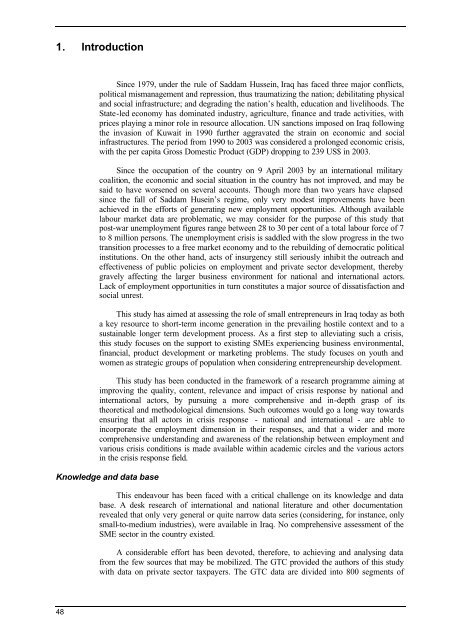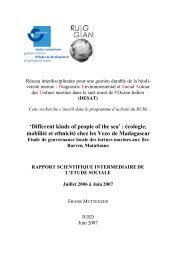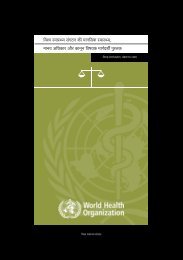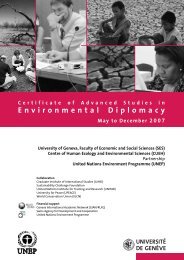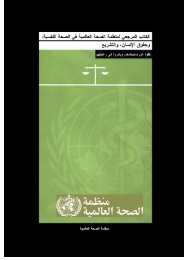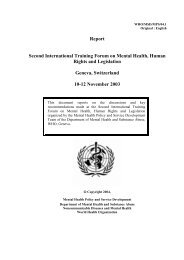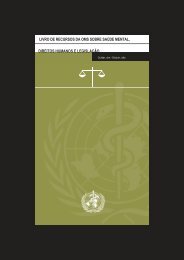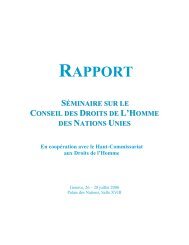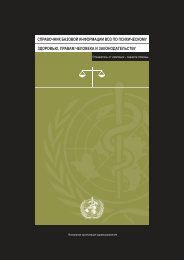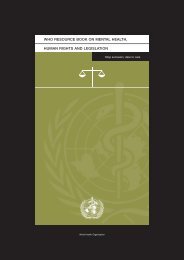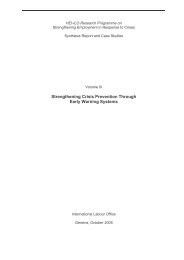Volume 1 Cedric - revised luca Final - RUIG-GIAN
Volume 1 Cedric - revised luca Final - RUIG-GIAN
Volume 1 Cedric - revised luca Final - RUIG-GIAN
You also want an ePaper? Increase the reach of your titles
YUMPU automatically turns print PDFs into web optimized ePapers that Google loves.
1. IntroductionSince 1979, under the rule of Saddam Hussein, Iraq has faced three major conflicts,political mismanagement and repression, thus traumatizing the nation; debilitating physicaland social infrastructure; and degrading the nation’s health, education and livelihoods. TheState-led economy has dominated industry, agriculture, finance and trade activities, withprices playing a minor role in resource allocation. UN sanctions imposed on Iraq followingthe invasion of Kuwait in 1990 further aggravated the strain on economic and socialinfrastructures. The period from 1990 to 2003 was considered a prolonged economic crisis,with the per capita Gross Domestic Product (GDP) dropping to 239 US$ in 2003.Since the occupation of the country on 9 April 2003 by an international militarycoalition, the economic and social situation in the country has not improved, and may besaid to have worsened on several accounts. Though more than two years have elapsedsince the fall of Saddam Husein’s regime, only very modest improvements have beenachieved in the efforts of generating new employment opportunities. Although availablelabour market data are problematic, we may consider for the purpose of this study thatpost-war unemployment figures range between 28 to 30 per cent of a total labour force of 7to 8 million persons. The unemployment crisis is saddled with the slow progress in the twotransition processes to a free market economy and to the rebuilding of democratic politicalinstitutions. On the other hand, acts of insurgency still seriously inhibit the outreach andeffectiveness of public policies on employment and private sector development, therebygravely affecting the larger business environment for national and international actors.Lack of employment opportunities in turn constitutes a major source of dissatisfaction andsocial unrest.This study has aimed at assessing the role of small entrepreneurs in Iraq today as botha key resource to short-term income generation in the prevailing hostile context and to asustainable longer term development process. As a first step to alleviating such a crisis,this study focuses on the support to existing SMEs experiencing business environmental,financial, product development or marketing problems. The study focuses on youth andwomen as strategic groups of population when considering entrepreneurship development.This study has been conducted in the framework of a research programme aiming atimproving the quality, content, relevance and impact of crisis response by national andinternational actors, by pursuing a more comprehensive and in-depth grasp of itstheoretical and methodological dimensions. Such outcomes would go a long way towardsensuring that all actors in crisis response - national and international - are able toincorporate the employment dimension in their responses, and that a wider and morecomprehensive understanding and awareness of the relationship between employment andvarious crisis conditions is made available within academic circles and the various actorsin the crisis response field.Knowledge and data baseThis endeavour has been faced with a critical challenge on its knowledge and database. A desk research of international and national literature and other documentationrevealed that only very general or quite narrow data series (considering, for instance, onlysmall-to-medium industries), were available in Iraq. No comprehensive assessment of theSME sector in the country existed.A considerable effort has been devoted, therefore, to achieving and analysing datafrom the few sources that may be mobilized. The GTC provided the authors of this studywith data on private sector taxpayers. The GTC data are divided into 800 segments of48


